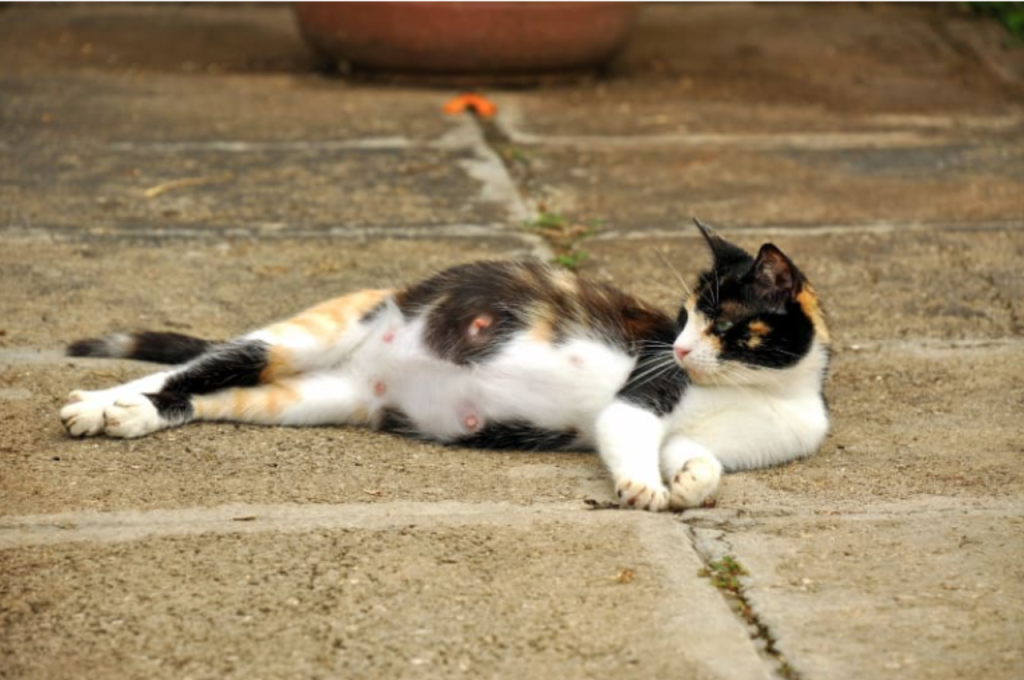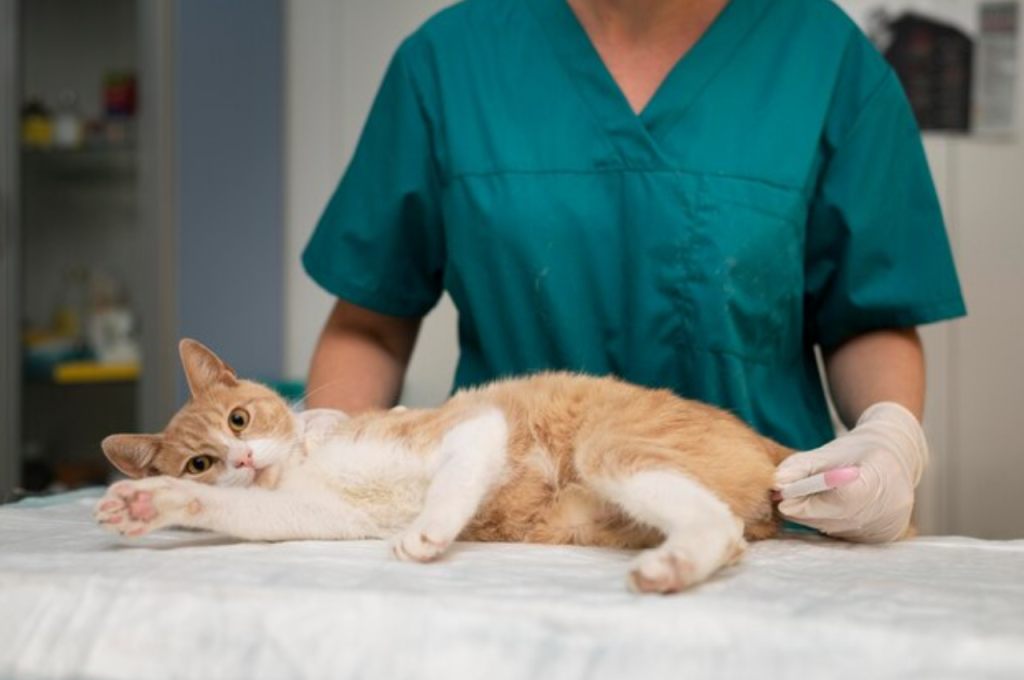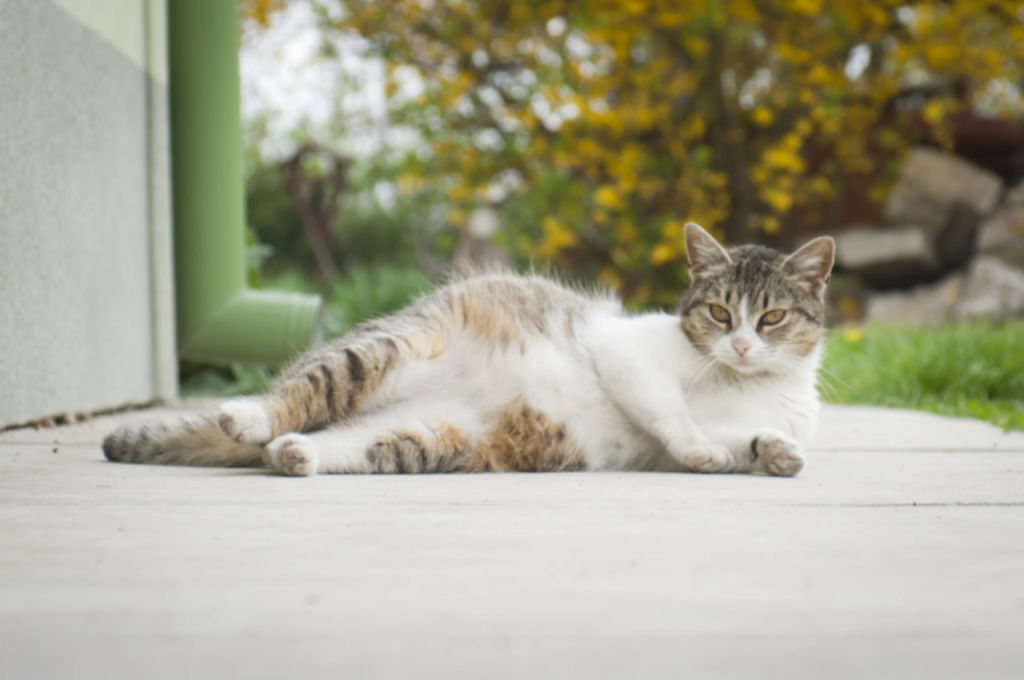To determine if a cat is pregnant, look for physical and behavioral changes. Symptoms include enlarged nipples, weight gain, and increased appetite.
Cats are wonderful pets that are known for being independent, self-sufficient, and ferociously playful. If you’re the proud owner of a female cat, knowing how to tell if she’s pregnant is important to ensure she receives proper care. Pregnancy in cats lasts approximately two months and has both physical and behavioral symptoms.
Some cats show obvious physical changes, such as enlarged nipples and a swollen belly, while others stay quite slim even until the end of the gestation period. Additionally, a pregnant cat may experience changes in behavior, including increased appetite, lethargy, and nesting behaviors. Keep reading to learn more about how to identify if your cat is pregnant.
Signs of Cat Pregnancy
Cat owners may suspect pregnancy based on certain signs. These indicators include a swollen belly, weight gain, and changes in appetite and behavior. A visit to a veterinarian can confirm pregnancy and provide advice on caring for a pregnant cat.

If you are a cat owner and think your cat may be pregnant, it’s essential to know the signs of cat pregnancy. Just like humans, cats show physical and behavioral changes when they are expecting. It’s crucial to recognize these signs so that you can provide proper care to your pregnant feline. Here are the significant signs of cat pregnancy that every owner should be aware of.
Changes in Behavior
A pregnant cat’s behavior changes significantly. She will become increasingly affectionate towards her owner, which is a common sign of pregnancy. She will seek attention and may even become clingy. Moreover, your cat may become more restless or agitated than usual. She may pace around the house or show less interest in her usual activities. This is a sign that your cat is experiencing hormonal changes and is starting to prepare for her kittens’ arrival.
Physical Changes
Physical changes are more apparent and a sure-shot way to confirm your cat’s pregnancy. A pregnant cat’s nipples will become darker and swollen than usual. You may even notice a milky discharge from the nipples.
As the pregnancy progresses, a visible round belly will start to appear. The cat’s belly may become quite hard when touched. Your cat may also gain weight or appear bloated, indicating the presence of kittens.
Behavior Changes to Watch For
One way to tell if a cat is pregnant is to monitor their behavior changes. Pregnant cats may act more affectionate or have changes in their appetite and sleeping patterns. It’s important to consult a vet for confirmation and to ensure the cat receives proper care.
Behavior Changes to Watch For If you suspect that your cat might be pregnant, there are various changes to her behavior that you should watch out for. While the most reliable way to confirm cat pregnancy is through a veterinary diagnosis, changes in behavior can help you identify whether your cat is pregnant or not. Here are the three behavior changes that you should watch out for:
Increase in Affection
One of the noticeable behavior changes in pregnant cats is an increase in their affection towards their owners. If you notice that your cat is cuddling more than usual or seeking more attention, it could be a sign that she is pregnant. Pregnant cats usually become more clingy as their pregnancy progresses, and they prefer to spend more time indoors.
Decrease in Activity
Another possible behavior change in pregnant cats is a decrease in their activity level. If you notice that your cat is sleeping more than usual or becoming less active, it could be an indication that she is pregnant. Pregnant cats tend to become lazier and less interested in playing as their pregnancy progresses.
Changes in Appetite
A cat’s appetite is also likely to change when pregnant. In the early stages of pregnancy, your cat may display a decreased appetite, while as the pregnancy progresses, the appetite may increase. If your cat’s food preferences have changed, or if she is less interested in eating than usual, it could be a sign of pregnancy.
In summary, if your cat is showing increased affection, decreased activity, and changes in appetite, those are some of the behavior changes that indicate your cat is pregnant. However, keep in mind that not all cats will exhibit these behavior changes, and the only sure way to confirm pregnancy is through a veterinary diagnosis.
Physical Changes to Watch For
Detecting whether a cat is pregnant isn’t easy since there are no significant changes for the first two or three weeks. However, as the pregnancy progresses, there are some physical changes to watch for, including an increased appetite, weight gain, and swollen nipples.
If you suspect that your cat might be pregnant, it is essential to keep an eye out for several physical changes. While not all cats display noticeable physical changes immediately, there are some signs to watch for. We have highlighted the three crucial physical symptoms that indicate a cat is pregnant.
Nipple Changes
One of the earliest signs of pregnancy in cats is a change in the nipples. As early as two weeks after conceiving, you may notice your cat’s nipples becoming more prominent, erect, and pink than before. The color may deepen throughout the pregnancy, turning a bright red in the final stages. It’s worth noting that not all cats’ nipples change noticeably, so other symptoms may need to be observed.
Abdominal Swelling
Around three to four weeks into pregnancy, you may start to notice a visible swelling in your cat’s abdomen. The swelling occurs due to the growing kittens, which press on the lining of the abdominal cavity, causing the belly to protrude. You may also observe your cat’s sides expanding and a general rounding of her belly.
Weight Gain
As the pregnancy progresses, your cat will gain weight. It is normal for a pregnant cat to put on between 1.5 to 2.5 pounds, or around 25% of her body weight. Weight gain is the most apparent indicator of pregnancy in cats, making it a symptom you should keep an eye on.
Tips for Confirming Pregnancy
Confirming pregnancy in cats can be tricky. Look for physical signs such as enlarged nipples and a thickening belly. A veterinary examination and ultrasound can also confirm pregnancy.
If you are a cat parent, it is important to know how to tell if your cat is pregnant. Confirming your cat’s pregnancy early on can help you provide the necessary care and support for her. Here are some tips for confirming pregnancy.
Consulting A Vet
The most reliable way to confirm if your cat is pregnant is to consult a veterinarian. A vet can conduct a physical exam and ultrasound to see if the cat is pregnant or not. The vet can also give you an estimated due date and advise you on the necessary care for your pregnant cat.
Purchasing A Pregnancy Test Kit
If you prefer a less invasive method, you can purchase a pregnancy test kit designed especially for cats. These kits detect hormone levels in your cat’s urine and can confirm pregnancy as early as two weeks after mating. Always read and follow the instructions on the kit carefully to get an accurate result.

Tips for the Cat Parent
Apart from consulting a vet or purchasing a pregnancy test kit, there are some visible signs that your cat is pregnant. Keep a lookout for these changes in your cat’s behavior and appearance:
- Increased appetite
- Weight gain
- Swollen belly
- Nipples become more prominent and darker
- Decreased activity and playfulness
- Changes in mood and behavior
If you notice any of these signs, it is important to take your cat to a vet for confirmation and further advice. Providing your pregnant cat with the necessary care and support can help ensure a healthy pregnancy and delivery.
Preparations for Your Expectant Feline
Determining whether your feline friend is pregnant can be tricky, but there are certain signs to watch out for. Look for enlarged nipples, increased appetite, and changes in behavior, and consult with your veterinarian for confirmation. Preparing for a pregnant cat involves providing proper nutrition, a comfortable nesting space, and regular veterinary check-ups.
Now that you suspect your feline friend is pregnant, it’s time to prepare a comfortable space and provide her with the necessary nutrition. These preparations will ensure that she remains healthy and comfortable throughout the gestation period. Here are some tips to help you prepare for the arrival of your expectant feline.
Setting Up A Comfortable Space
It’s essential to create a comfortable space for your cat to rest and give birth. Choose a quiet and peaceful area in your home where she can have privacy. You can prepare this area by:
- Provide a nesting box filled with soft towels, blankets, or shredded newspaper.
- Ensuring there is adequate ventilation in the room.
- Placing a litter box nearby to make it easy for her to use.
- Keeping the area clean and hygienic to avoid infections.
- Placing a scratching post nearby.
- Providing plenty of toys and mental stimulation to keep her active and happy.
You can also consider getting a birthing box from a pet store to provide a secure and comfortable space for your expecting feline. Ensure that the box is large enough for your cat to move around and has low sides to make it easy for her to get in and out.
Providing Proper Nutrition
Your expectant feline requires a balanced and nutritious diet to support her and her kittens’ growth. It’s important to provide her with high-quality kitten food as it contains more calories, vitamins, and minerals. Avoid feeding her with adult cat food or dog food as it may lack the essential nutrients required to support the growing fetus.
Consult your veterinarian for a recommended feeding plan, as your cat’s nutritional requirements will vary throughout the pregnancy. Ensure that she always has access to fresh water and that the water bowl is cleaned regularly.
Care During Pregnancy
During pregnancy, it can be difficult to tell if a cat is pregnant. However, some signs to look out for include weight gain, nipple enlargement, and behavioral changes such as nesting behavior and decreased appetite. It’s important to visit a veterinarian for confirmation and proper care.
During a cat’s pregnancy, it is important to provide proper care to ensure the health of both the mother and her kittens. Monitoring her health and scheduling regular vet visits are essential aspects of this care.
Monitoring Health
To monitor your pregnant cat’s health, it is important to pay attention to any changes in her behavior and physical appearance. These changes can indicate her overall health and the health of the kittens. Some signs that your cat may be pregnant include weight gain, increased appetite, and enlarged nipples.
As the pregnancy progresses, you may also notice movement in her belly, indicating the presence of kittens. To ensure a healthy pregnancy, it is important to provide proper nutrition and exercise for your pregnant cat. Speak to your vet for recommendations on a suitable diet and exercise plan.
Regular Vet Visits
Regular vet visits are crucial during your cat’s pregnancy. Your vet will be able to monitor the health of your cat and her kittens and ensure that they are developing properly. During these visits, your vet may perform ultrasounds to check the kittens’ health and conduct blood tests to ensure your cat is healthy. They may also prescribe vitamins or supplements to support the pregnancy and discuss options for delivery. Scheduling regular vet visits can also ensure that any potential issues are caught and treated early on, leading to a healthier outcome for your cat and her kittens.
Preparing for the Arrival of Kittens
Preparing for the arrival of kittens includes being able to tell if a cat is pregnant. Look out for physical changes such as nipple enlargement and behavioral changes such as increased appetite to determine pregnancy in cats. Ensure you prepare for the arrival of the kittens by creating a comfortable and safe space for them.
Preparing for the Arrival of Kittens: Congratulations, your feline friend is pregnant! As a pet parent, you should now start preparing for the arrival of the new kittens. This means getting the necessary supplies and ensuring your cat is comfortable and healthy throughout the pregnancy period. The following are some essential things you need to consider.
Preparing a Birthing Box: Creating a birthing box is crucial to ensure your cat feels safe and secure during the labor process. The box can be a cardboard box or a carrier with plenty of blankets and towels for comfort. One side should be lowered for ease of entry and exit, and it should be placed in a private, quiet location away from other animals and humans. Ensure the area around the box is clean and free from any hazards.
Educating Yourself on the Labor Process: As a pet parent, it is important to educate yourself on the labor process of cats. This will help you to monitor your cat’s health and know when to seek veterinary assistance. Some signs that indicate labor include restlessness, meowing, and increased nesting behavior. You should also be aware of any complications such as dystocia, which is difficulty in delivering the kittens.
Expectations for the First Few Weeks: During the first few weeks, it is essential to provide adequate care for both the mother cat and kittens. This includes ensuring that the mother is well-fed and hydrated, offering a safe and warm environment, and monitoring the kittens’ growth and health. It is also important to avoid overcrowding the kittens or disturbing the mother during this period.
Final Tips
If you think your cat might be pregnant, there are a few key signs to look out for. These include a swollen abdomen, nipples becoming more prominent, and changes in behavior such as increased affection or appetite. If you suspect your cat is pregnant, it’s important to consult with a veterinarian for proper care.
Patience is Key
When trying to determine if your cat is pregnant, it’s important to remember that patience is key. It can take several weeks for some of the most obvious signs, like a noticeable bump or enlarged nipples, to appear. In the meantime, keep a close eye on your cat’s behavior and take note of any changes in appetite or behavior. It can also be helpful to keep track of your cat’s weight to see if she’s putting on any extra pounds.
Don’t Hesitate to Ask for Help
If you’re unsure whether or not your cat is pregnant, don’t hesitate to ask for help. A veterinarian can perform a thorough exam to determine whether or not your cat is expecting and can give you advice on how to care for her during this time. They can also discuss options for spaying or neutering your cat in the future to prevent unwanted litters.
Keep Your Cat Healthy and Stress-free
During your cat’s pregnancy, it’s important to keep her healthy and stress-free. This means feeding her a high-quality diet and providing her with plenty of opportunities for exercise and play. You’ll also want to make sure she has a comfortable place to rest and plenty of fresh water to drink.

Additionally, try to keep your cat’s routine as consistent as possible and avoid any unnecessary stressors, like loud noises or changes in her environment. This can help keep your cat relaxed and comfortable throughout her pregnancy. Remember, detecting pregnancy early on and taking good care of your furry friend can help increase the chances of a healthy litter and a smooth pregnancy.
Frequently Asked Questions
Frequently Asked Questions: How to know if your feline is expecting
1. How soon can you tell if a cat is pregnant?
You can tell if a cat is pregnant as early as two weeks after mating. There are physical indications including swelling of the nipples, weight gain, and changes in behavior. However, it’s always best to consult with a veterinarian for proper diagnosis and care.
2. What does a pregnant cat’s belly feel like?
A pregnant cat’s belly will feel firm and round to the touch. As the pregnancy progresses, it will become more noticeable and larger. It’s important to monitor your cat’s progression and seek veterinarian care if there are any concerns.
3. What do cats look like in early pregnancy?
Cats in early pregnancy may appear normal in appearance, but some physical and behavioral changes may be observed. Their nipples may become swollen and pink, and they may become more affectionate or clingy. It is recommended to consult with a veterinarian to confirm pregnancy and discuss appropriate care.
4. How can I test my cat for pregnancy at home?
Home pregnancy tests for cats are not reliable, so it’s best to see a veterinarian. Your vet can confirm the pregnancy, estimate the due date, and help you take care of your pregnant cat. Signs of pregnancy include weight gain, nipples that are pinker and more prominent, and a swollen abdomen.
Conclusion
Based on the signs and symptoms mentioned in this guide, it’s essential to keep an eye on your cat’s behavior if you suspect she’s pregnant. Knowing how to tell if a cat is pregnant can help you prepare for the upcoming litter properly.
In case you have further questions or doubts, it’s always best to consult a veterinarian for proper guidance. Remember, cats’ health and safety should always be your top priority.
